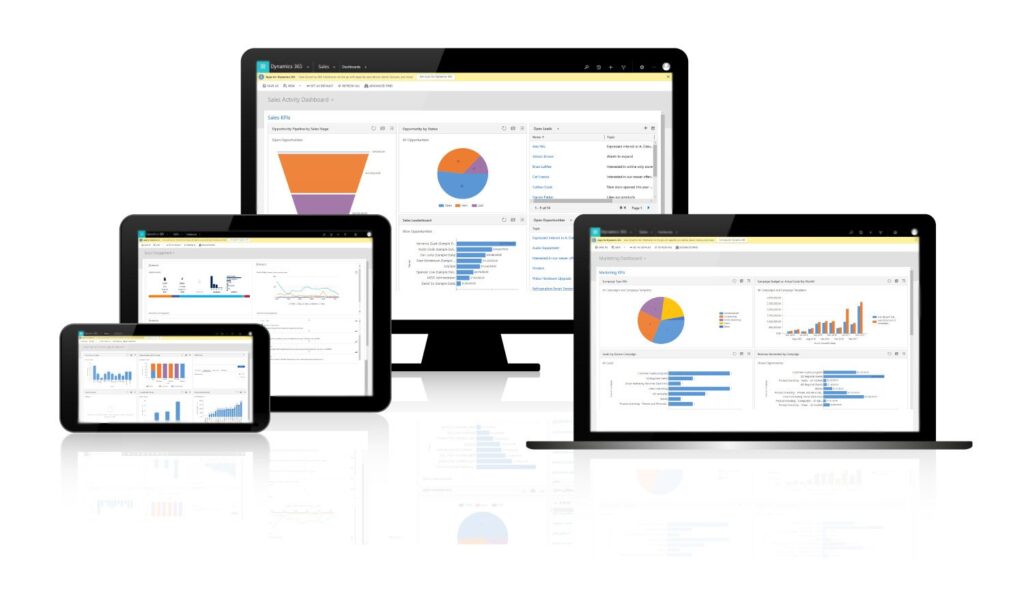
Microsoft Dynamics 365 is widely regarded as a leading ERP (Enterprise Resource Planning) solution for numerous reasons. With its comprehensive suite of integrated applications and robust functionality, Dynamics 365 offers organisations a powerful platform to streamline operations, enhance productivity, and drive business growth. Some of the key factors that contribute to the success and popularity of Microsoft Dynamics 365 as a leading ERP solution are:
- Comprehensive Functionality: Microsoft Dynamics 365 provides a wide range of modules and capabilities that cater to various aspects of business operations. From finance and operations to sales, marketing, customer service, and human resources, Dynamics 365 offers a comprehensive suite of integrated applications. This comprehensive functionality enables organisations to manage their entire business ecosystem within a single platform, eliminating the need for disparate systems and ensuring seamless data flow and real-time visibility across different departments.
- Scalable Cloud-Based Architecture: Dynamics 365 is built on a cloud-based architecture, leveraging the power and scalability of Microsoft Azure. This architecture enables organisations to scale their operations as needed, accommodating growth and changes in business requirements. With cloud deployment, organisations can access their ERP solution from anywhere, at any time, and enjoy automatic updates and patches, ensuring they always have access to the latest features and enhancements.
- Seamless Integration with Microsoft Ecosystem: As part of the Microsoft ecosystem, Dynamics 365 seamlessly integrates with other Microsoft products and services. This integration includes seamless connectivity with Office 365, Microsoft Power Platform, Azure services, Power BI and other Microsoft applications. By leveraging these integrations, organizations can create a connected ecosystem that enhances productivity and collaboration. For example, users can access Dynamics 365 data directly from familiar Microsoft applications such as Outlook, Excel, and Teams, improving efficiency and user adoption.
- Powerful Analytics and Reporting: Dynamics 365 offers robust analytics and reporting capabilities through integration with Power BI, Microsoft’s powerful business intelligence tool. Organisations can leverage this integration to gain valuable insights from their ERP data, create interactive dashboards, and generate customised reports. With real-time analytics, decision-makers can make data-driven decisions, monitor key performance indicators (KPIs), and identify trends and opportunities for optimisation.
- AI and Machine Learning Capabilities: Microsoft has made significant investments in incorporating artificial intelligence (AI) and machine learning (ML) capabilities into Dynamics 365. These advanced technologies enable organisations to automate processes, gain predictive insights, and enhance decision-making. For example, AI-driven features within Dynamics 365 Sales can provide sales teams with intelligent lead scoring, recommendation engines, and predictive forecasting, empowering them to prioritise leads, personalize customer interactions, and optimise sales strategies.
- Flexible Customisation and Extensibility: Dynamics 365 offers flexibility and extensibility to tailor the solution to specific business needs. Organisations can customise workflows, forms, and views to align with their unique processes and industry requirements. Additionally, the Power Platform integration allows users to build custom applications, automate workflows, and create intelligent chatbots without extensive coding knowledge. This flexibility ensures that organizations can adapt and evolve their ERP solution to match their evolving business needs.
- Strong Community and Support: Microsoft Dynamics 365 benefits from a strong and vibrant community of users, partners, and developers. This community provides a wealth of resources, including forums, blogs, and user groups, where users can find answers to their questions, learn best practices, and share insights. Additionally, Microsoft offers comprehensive technical support and documentation, ensuring that organisations have the necessary assistance and resources to maximise the value of their Dynamics 365 implementation.
The Microsoft Dynamics 365 product family stands as a comprehensive suite of integrated applications designed to empower organisations across industries. Built on a robust cloud-based architecture, Dynamics 365 offers a wide range of modules tailored to meet diverse business needs, spanning from customer engagement and sales to finance, operations, human resources, and more. Below, we explore the capabilities and business value of the Microsoft Dynamics 365 product family, exploring its architecture, key components, and features that drive digital transformation and business success.
- Architecture and Integration: At the heart of the Microsoft Dynamics 365 product family lies a flexible and scalable cloud-based architecture. Leveraging the power of Microsoft Azure, the solution offers a unified platform for organisations to manage their business processes, store data securely, and access applications from anywhere, anytime. As discussed earlier, the architecture ensures seamless integration with other Microsoft technologies, enabling organisations to leverage their existing investments and create a connected ecosystem that drives productivity and innovation.
- Dynamics 365 Customer Engagement: Dynamics 365 Customer Engagement serves as a core component of the product family, focusing on sales, marketing, and customer service. Let’s explore the key modules within this suite:
a. Dynamics 365 Sales: Dynamics 365 Sales empowers sales teams with a comprehensive set of tools to manage customer relationships, track leads, and drive revenue growth. The module offers functionalities such as pipeline management, opportunity tracking, forecasting, and AI-driven insights. Sales professionals can leverage these features to streamline their sales processes, prioritise leads, and make data-driven decisions that enhance their sales effectiveness.b. Dynamics 365 Marketing: Designed to help organisations deliver personalised and targeted marketing campaigns, Dynamics 365 Marketing enables marketers to plan, execute, and analyse multichannel campaigns. It offers capabilities such as email marketing, lead nurturing, social media management, event management, and customer journey orchestration. Marketers can leverage these tools to engage customers across various touchpoints, measure campaign effectiveness, and optimise their marketing strategies for maximum impact.c. Dynamics 365 Customer Service: Dynamics 365 Customer Service focuses on delivering exceptional customer experiences and providing efficient support. This module offers case management, knowledge base management, service level agreements (SLAs), omnichannel support, and self-service options for customers. With these capabilities, organisations can streamline their customer service processes, resolve issues promptly, and build long-lasting customer relationships. - Dynamics 365 Finance and Operations: Dynamics 365 Finance and Operations (formerly known as Dynamics AX) caters to organisations seeking comprehensive financial management, supply chain management, and manufacturing capabilities. Let’s delve into the key components:a. Dynamics 365 Finance: Dynamics 365 Finance enables organisations to effectively manage their financial operations. The module encompasses functionality such as a general ledger, accounts payable and receivable, budgeting, cash flow management, fixed asset management, and financial reporting. With real-time financial insights, organisations can make informed decisions, optimise cash flow, and ensure compliance with regulatory requirements.b. Dynamics 365 Supply Chain Management: With Dynamics 365 Supply Chain Management, organisations can optimise their supply chain processes and drive operational efficiency. The module includes functionality for inventory management, demand forecasting, procurement, production planning, warehouse management, and transportation management. These features empower organisations to streamline their supply chain operations, minimise costs, improve inventory visibility, and enhance overall supply chain performance.
c. Dynamics 365 Commerce: Dynamics 365 Commerce is designed specifically for retail and eCommerce businesses. It offers comprehensive features to manage end-to-end commerce operations, including product catalogue management, pricing and promotions, order management, point of sale (POS), and customer loyalty programs. By leveraging Dynamics 365 Commerce, organisations can deliver seamless shopping experiences across various channels, increase customer satisfaction, and drive revenue growth.
- Dynamics 365 Human Resources: Dynamics 365 Human Resources (formerly known as Dynamics 365 for Talent) focuses on managing human capital and enhancing the employee experience. Key components include:a. Dynamics 365 Core HR: Dynamics 365 Core HR offers functionality to manage employee profiles, onboarding, benefits administration, leave and absence management, compliance, and performance management. It helps organisations streamline their HR processes, improve workforce productivity, and ensure compliance with labor regulations.b. Dynamics 365 Talent Acquisition: Dynamics 365 Talent Acquisition enables organisations to attract and onboard top talent effectively. The module offers features such as job posting, applicant tracking, candidate evaluation, interview management, and background screening. By streamlining the recruitment process, organisations can identify the right candidates efficiently and expedite the onboarding process.c. Dynamics 365 Talent Development: Dynamics 365 Talent Development focuses on employee learning and development. The module provides functionalities for training management, competency tracking, performance management, and succession planning. Organisations can create personalised learning paths, track employee progress, and align talent development initiatives with business goals, fostering a culture of continuous learning and growth.
- Power Platform Integration: The Microsoft Power Platform seamlessly integrates with Dynamics 365, extending its capabilities and enabling organisations to create custom applications, automate workflows, analyse data, and build intelligent chatbots. The Power Platform consists of a. Power Apps: Power Apps allows organisations to create custom business applications with a no-code or low-code approach. Organisations can build tailored apps to address specific business needs, enhance productivity, and leverage data from Dynamics 365 and other sources.b. Power Automate: Power Automate (previously known as Microsoft Flow) enables organisations to automate repetitive tasks, integrate systems, and streamline workflows across different applications. It offers a wide range of connectors, allowing organisations to create automated processes that span Dynamics 365 and other business systems.c. Power BI: Power BI provides robust data visualisation and analytics capabilities. Organizations can create interactive dashboards and reports, gaining valuable insights from their Dynamics 365 data and other data sources. Power BI empowers decision-makers to make data-driven decisions and monitor key performance indicators (KPIs) effectively.
d. Power Virtual Agents: Power Virtual Agents allows organisations to build AI-powered chatbots without extensive coding knowledge. These chatbots can be deployed across various channels to provide automated support, answer frequently asked questions, and guide users through self-service processes.
- Business Central: is a solution designed to help small and midsize companies manage their financials, inventory, sales, purchase and customer service. It combines a range of business functions into a single system.Key components include:a. Financial management, Sales and Purchase orders; Inventory Control; Customer Service and Relationship Management; Collaborative Workspaces, Employee Time Sheeting and Dashboards for real-time insights into performance.b. Enables companies to gain real-time insights into every aspect of their business operations thereby allowing them to build long-term strategies with confidence.
c. Increased efficiency of operations leading to improved organisational performance to better customer experience as a result of faster response time and superior service.
7. Dynamics 365 Customer Insights: is a powerful customer data platform (CDP). It enables organisations to unify and derive actionable insights from their customer data, empowering them to deliver personalised and engaging experiences to their customers. Customer Insights combines data from various sources and provides a holistic view of customer interactions, preferences, and behaviors. Customer Insights allows businesses build a Unified Customer Profile, to bring together customer data from multiple sources, such as transactional data, CRM systems, website interactions, and social media, into a single, unified customer profile. This unified view provides a comprehensive understanding of individual customers, including their demographics, preferences, purchase history, and engagement patterns.
Customer Insights integrates with various data sources, to gather customer data, employing data cleansing and enrichment capabilities to ensure data accuracy and consistency. Customer Insights allows customers to segment their customer base based on specific attributes, behaviors, or preferences. This segmentation allows businesses to create targeted marketing campaigns, personalised product recommendations, and tailored customer experiences. Customer Insights also provides audience insights, enabling organisations to understand the characteristics and behaviors of different customer segments to enhance their marketing strategies. AI-Driven Insights and Predictive Analytics support insights such as churn prediction, customer lifetime value, and propensity to purchase, helping businesses make data-driven decisions.
8. Dynamics 365 Customer Voice: (formerly known as Microsoft Forms Pro) is a feedback management application enabling the collection and analysis, of customer feedback to improve customer experiences, drive customer satisfaction, and make data-driven business decisions.
Summing Up
The Microsoft Dynamics 365 product family offers a comprehensive suite of integrated applications that drive digital transformation and empower organisations across industries. With its flexible architecture, seamless integration capabilities, and powerful features, Dynamics 365 enables businesses to streamline operations, enhance customer engagement, and achieve their strategic goals. From customer engagement and sales to finance, operations, and human resources, Dynamics 365 provides organisations with the tools they need to succeed in today’s dynamic business landscape. By leveraging the power of the Microsoft Dynamics 365 product family and its integration with the Power Platform, organisations can unlock their full potential, drive innovation, and thrive.





